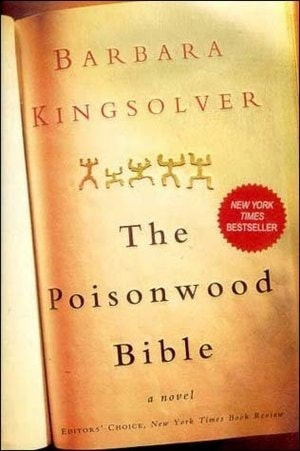At the time, I'd read several other books by Kingsolver, and for some reason, I didn't enjoy The Poisonwood Bible. Since that time, I've remembered that--though I love Kingsolver--this book was my least favorite of hers. What was I thinking?! This novel blew me away. "Everything you're sure is right can be wrong in another place" (505). It's the story of the Prices, a missionary family from the Southern United States who travel to the Congo in 1959, completely unprepared for what they'll find. The women are the true stars of this narrative: mother Orleanna and the family's four daughters are dragged along by patriarch Nathan. The narrative alternates between those five distinct female characters--I could not believe how unique each voice was. I didn't even need the chapter headers to know who was speaking. The book, which covers decades, is wide ranging. Nathan, determined to convert the Congolese, can hear no voice and see no perspective but his own. He is both a realistic character and a symbol for the colonialism that has intruded on the Congo--first the Belgians, who maintain a presence despite their official surrender, and then the British, Americans, and Soviets, who each seek to maintain influence so they can take advantage of the country's resources. Nathan's family initially is so focused on the life they left that they can't see their own situation or the lives of those around them clearly. But as they continue to live in the Congo, they come to understand the type of power they lack and the ways that they can work around that absence to assert their independence in spite of it. Coming to know each woman here was my favorite part of this book--Kingsolver is such an amazing writer (I was employing my book darts liberally!), and though I found gorgeous sentences and thought-provoking ideas everywhere, I never confused Rachel's vanity and superficiality with Leah's toughness and determination to do what's right, or Ruth May's attempts to escape her birth-order fate as the youngest to move ahead with Adah's brilliant--and silent--determination to opt out of the demoralizingly mundane daily life of her family. Orleanna narrates her sections from decades after the Prices have left the Congo, and her reflection of what she lost and, perhaps, gained there gives her sections a resonance that is both painful and keen. "There is not justice in this world. Father, forgive me wherever you are, but this world has brought one vile abomination after another down on the heads of the gentle, and I'll not live to see the meek inherit anything. What there is in this world, I think, is a tendency for human errors to level themselves like water throughout their sphere of influence. That's pretty much the whole of what I can say, looking back. There's the possibility of balance. Unbearable burdens that the world somehow does bear with a certain grace" (522). Most of all, there's a beautiful sense of place here. Kingsolver--through research and travel to other parts of Africa (as she explains in her Author's Note)--communicates the brutality and eminence of nature, the ways that despite the Prices' attempts to control their world, it doesn't take long for the land of the Congo to erase the evidence of their existence. I could not have loved this book more, and I'm so glad to have the chance to be reminded, once again, that we never read the same book twice, that as we change, our responses to and understandings of the books we read necessarily change as well.
1 Comment
|
AuthorI'm Jen Moyers, co-host of the Unabridged Podcast and an English teacher. Archives
July 2021
Categories
All
|
Proudly powered by Weebly

 RSS Feed
RSS Feed